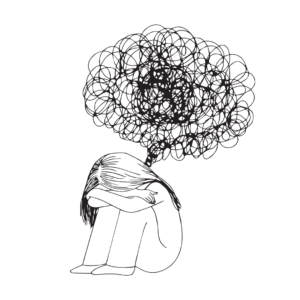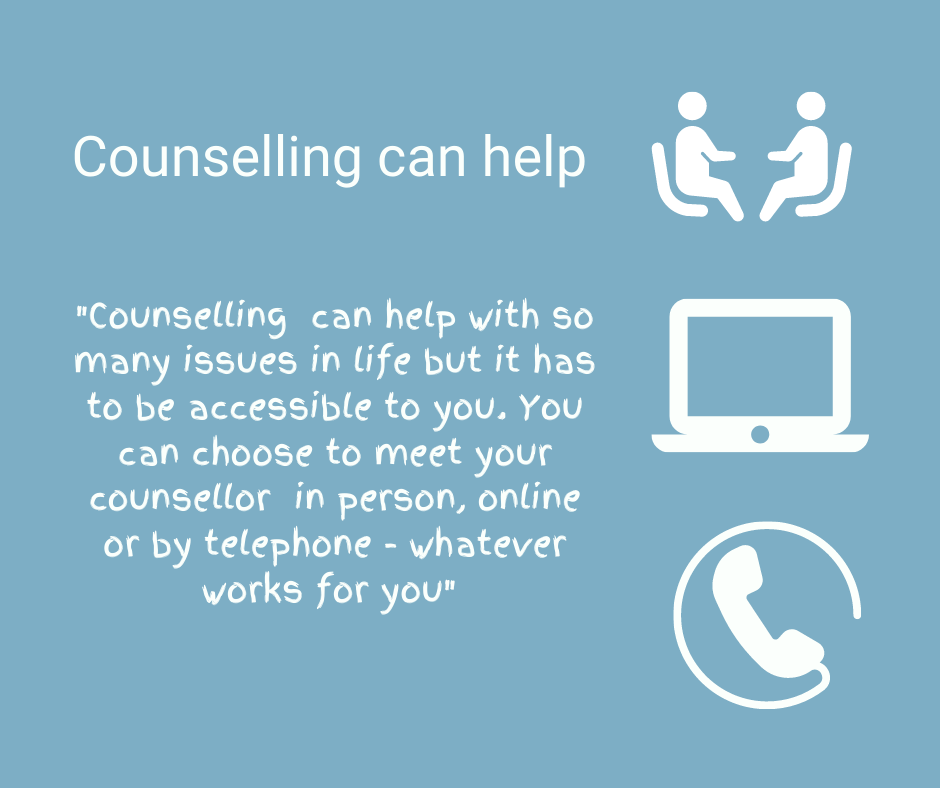
What is Cognitive Behaviour Therapy?
You might have heard the term Cognitive Behaviour Therapy. It’s sometimes shortened to CBT. CBT is a talking therapy that is growing in popularity. It is often recommended as a treatment for mild to moderate anxiety and depression.
How does CBT work?
CBT is based on the belief that our thoughts, feelings and actions are connected in some way. The therapy aims to identify unhelpful patterns of thoughts and behaviours. Things which could cause the continuation of distressing symptoms such as depression and anxiety.
Throughout the treatment the therapist and client work together to find ways to make changes to the unhelpful thoughts and behaviours. These changes then help the client feel differently and achieve their goals.
CBT is a practical approach giving you the tools and techniques to help take control of your own wellbeing. Teaching you self-care techniques, building hope and motivation and gaining inner strength.
Research into CBT
There is a substantial amount of research showing that CBT is successful at treating common mental health problems such as depression, anxiety, OCD, phobias, social anxiety, panic attacks and PTSD. Furthermore, CBT is the NICE (National Institute for Health and Care Excellence) recommended treatment for these common mental health problems. NICE is the organisation that advises Doctors on the best treatments to use.
What happens in a session
Clients usually have a number of CBT sessions, often on a weekly basis. They are one to one with the therapist and can be in person or online via video call. Session usually last for 50 minutes.
During the sessions, the therapist will ask questions to find out about the client’s issues. They’ll then try to break down the issues into their separate parts, such as thoughts, physical feelings and actions.
The therapist and client work together to analyse these areas to see if they’re unrealistic or unhelpful. Ultimately the therapist will aim to give the client ways in which they can change unhelpful thoughts and behaviours.
The client will be given tools and techniques to practice in their daily life with the aim of discussing progress and experiences in following sessions.
The eventual aim of therapy is to teach the client how to apply the skills they have learnt during treatment to their daily life.
Pros and cons of CBT
Pros:
- Short term – the therapy tends to take about 6 weekly sessions. That’s a lot shorter than many other talking therapies
- Educational – it aims to teach clients practical skills and techniques that can be used in everyday life.
- Individual – it concentrates on a persons ability to change themselves.
- Successful – it has been found to be as effective as some medication in treating certain mental health issues
Cons:
- Commitment – you will need to apply yourself to the process. The therapist will advise you but you will need to work to change your behaviours.
- Confrontation – you have to be prepared to face your emotions and behaviours and be prepared to change. The therapy can make people feel uncomfortable initially.
- Past issues – CBT focusses on current problems. It does not address the possible underlying causes of mental health conditions, such as an unhappy childhood.
Frequently Asked Questions
-
What conditions can CBT treat?
CBT is effective in treating some mental health problems, but it may not be successful or suitable for everyone. It has been found to be effective for depression, anxiety, OCD, phobias, social anxiety, panic attacks and PTSD. It has also helped some people with physical health conditions such as chronic pain but it is not renowned for the.
-
Can I explore issues from my past in CBT?
CBT addresses current problems and focuses on specific issues. It does not address the possible underlying causes of mental health conditions and might not be the best approach to exploring past experiences.
-
How many sessions of CBT will I need?
That’s really impossible to answer. The number of sessions needed depends entirely on what you, your issues and your individual need. A reputable therapist will explain this at the outset and guide you as you progress through your CBT
-
How do I find a CBT therapist?
Choose a therapist from a reputable register such as the British Association of Counsellors and Psychotherapists. If you see a therapist adverting privately check that they are registerd with a relevant professional body and fully qualified.
-
Why do I need to check the counsellors credentials?
Counselling isn’t a regulated industry. Anyone can set up as a counsellor – they don’t need to have any training, qualifications or experience
Introducing Lowri Davies
Lowri is a CBT therapist based at Phoe nix Health and Wellbeing. Here’s some words about her from her!
nix Health and Wellbeing. Here’s some words about her from her!
“Hi I am Lowri. I am a Psychotherapist with over 20 years’ experience of working people with a range of mental health struggles, in a variety of different settings. In that time, I have helped people with depression, anxiety and worry and stress, eating disorders, OCD, Phobias, Panic, self-esteem issues, PTSD and trauma and bereavement and grief issues.
I’m a qualified and Accredited CBT therapist and I’m working towards EMDR practitioner accreditation.
I use CBT and EMDR as my main mode of therapy but use an integrative approach, drawing on elements of Acceptance and commitment Therapy, Compassion Focused Therapy, Transactional Analysis, Mindfulness, Counselling. My counselling qualification and experience also helps to ensure I’m able to build a solid therapeutic relationship in which you can feel safe to open up and feel listened to.
I appreciate that no two individuals or experiences are the same. Therefore, I strive to offer an individualised flexible approach, to help you feel supported to take important but often scary steps towards change, regaining inner strength and control in your life.
I offer therapy face to face, telephone or online via video, making therapy more accessible and flexible to meet your needs.
Phoenix Health & Wellbeing is a Charity and social enterprise. We use the proceeds of your treatment to subsidise those who would not otherwise be able to access our therapies. Roughly £4 to every £10 spent with us will go to help others.
If you would like more information about Phoenix Health and Wellbeing click here . For information on our charitable work follow this link or call us on 0113 234 0181
Opening times:
Monday to Thursday from 10:00 to 20:00
Friday and Saturday from 11:00 to 16:00
Sunday closed.





